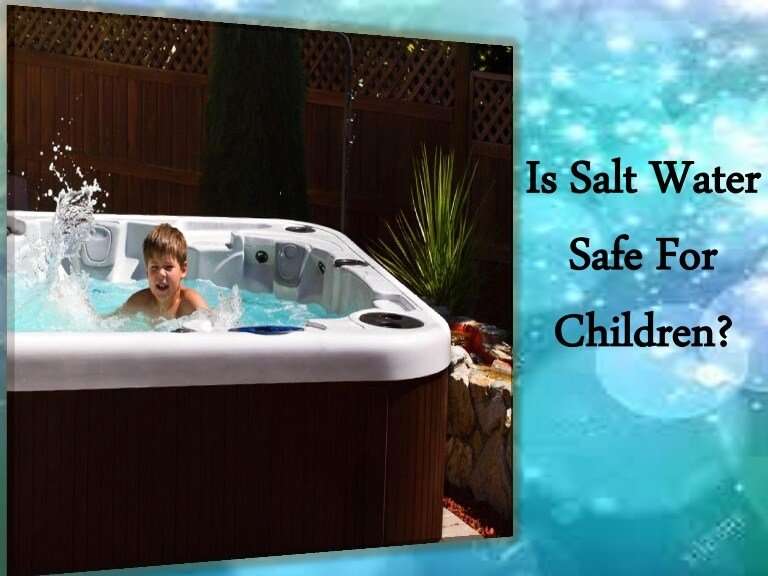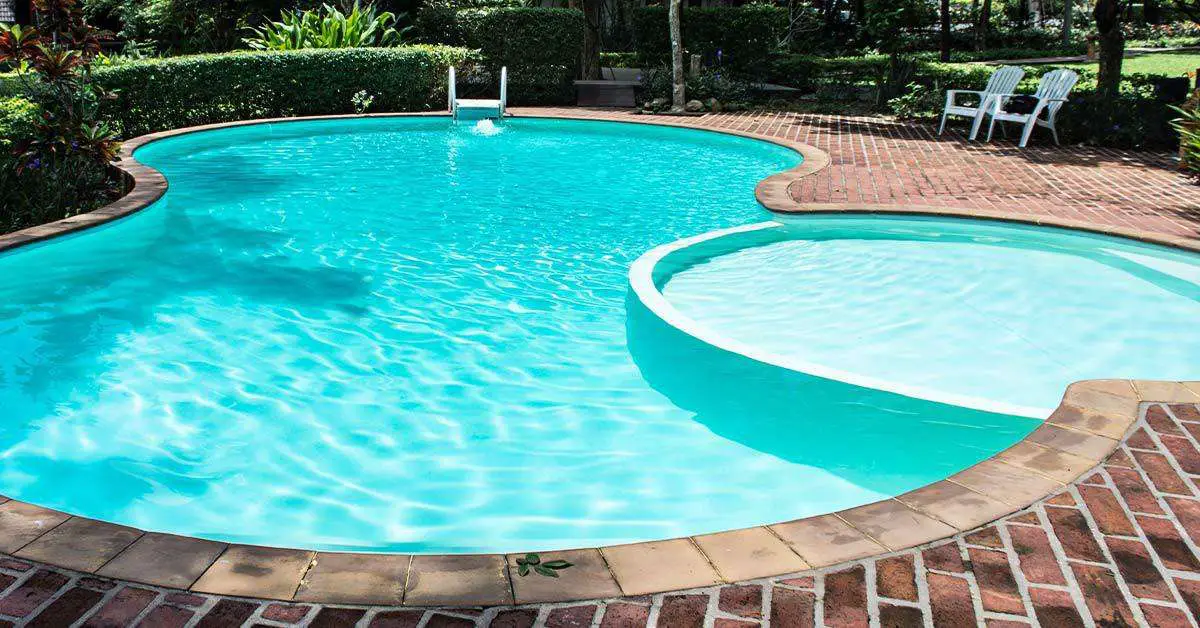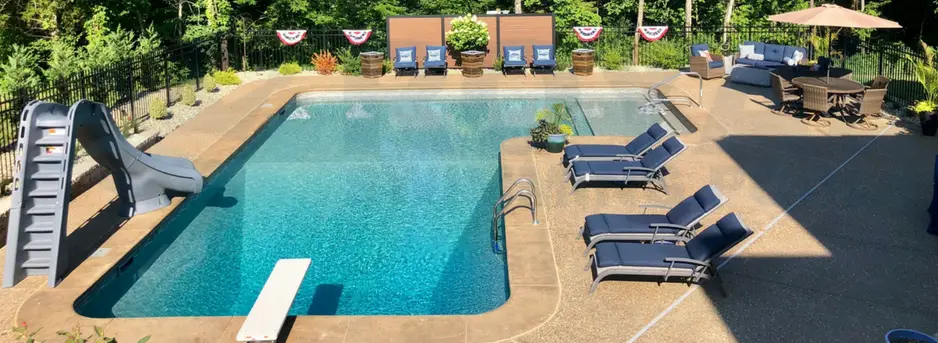What About The Pool Liner
If you have an inground pool with a galvanized wall behind the liner, and your liner springs a leak, the wall could potentially corrode due to the salt in the water.
Salt can also cause an issue for above ground pools, which tend to have metal parts make up the top of the pool. These metal parts, when exposed to salt, can rust over time
Salt Water Pool Heater
Inground salt water pool heaters cost between $550 to over $10,000, with most pool owners spending from $2,200 to $3,500, and another $400 to $500 for installation. What drives the difference in heater prices for pool heaters is how much water you need to heat, and what the rise in temperature is from the average coldest temperature to the desired water temperature. A heater for an above-ground salt water pool costs from $50 to $200.
- Electric tankless water heaters are suitable for small pools that dont need for the temperature to rise too much, and these generally start between $500 and $600.
- Larger and more powerful electric pool water heaters average between $1,500 and $3,500, while the similar gas-powered pool water heaters fall between $800 and $2,500.
- Electric pump water heaters cost anywhere from $2,500 to$10,000 and these work in hotter climates and transfer the heat in the air to the water in the pool, and they do so very economically.
- A salt water pool heater for your inground pool will cost $50 to $250 per month in electrical costs.
S To Converting Your Pool To A Saltwater Pool
If you currently have chlorine, you may want to know how you would go about transitioning the pool from a chlorine to a saltwater system. Here are the basic steps:
1. Choose your saltwater system.
There are essentially two considerations when you think about which saltwater pool system makes sense for you:
2. Decide if you will drain the pool.
You currently have water in your pool. You want to think about what to do with that water before you set up the chlorinator.
Should you drain your pool? It is actually unnecessary unless you are currently using polyhexamethylene biguanide in which case it is optional.
Polyhexamethylene biguanide is the active ingredient in an antibacterial pool sanitizer that is incompatible with chlorine. Your chemicals could be thrown out of balance in which case your chlorine may not be able to maintain cleanliness if you leave this chemical in the water.
3. Embrace balance.
Salt is central to saltwater pool conversion, but you want to know other levels too. Typically chemical testing looks at calcium hardness, free chlorine, pH, and alkalinity. Healthy ranges for your pool water are as follows:
Recommended Reading: Sustain Pool
Should Pool Owners Switch From Chlorine To Saltwater
With the savage winter a memory, Lisa Busso-Raglievich last weekend finally got to test her swimming pools new saltwater chlorination system, and she quickly was convinced it was a good use of $2,000.
No stinging eyes. No need to store bottles of chlorine in the shed. No more trips to the pool store to test the waters contents.
The expense of chlorine is an expense, Busso-Raglievich, 46, of Freehold Township said, ticking off all that went into maintaining the pool.
The swimming pool season has arrived, and some Jersey Shore homeowners are converting from their traditional chlorine sanitation systems to saltwater-based systems. The new system is equally effective at killing viruses and bacteria, and it is safer to operate, one chemist said, even though it doesnt eliminate maintenance altogether.
The trend comes just in time for the swimming pool industry that was battered during the recession. Pool companies coming out of the recession are finding work not necessarily building new pools, but converting existing ones.
Theres still issues with home-equity and financing, said Steven Metz, an owner of Central Jersey Pools in Freehold Township. But people who have pools have been upgrading them.
Pools: Skip The Saltwater And Stick With Chlorine

Lets talk about pools! Have you been tempted to convert your chlorine pool to a saltwater pool? You might want to hold off.
We promise there is someone else reading this article right now who has already made the conversion and is considering converting back to a traditional chlorine system. Heres why.
Theres a lot of buzz out there right now about how saltwater pools are better than chlorine pools, but that isnt necessarily the case.
Although saltwater pools are touted to be easier on your eyes and skin, they come with a whole host of other issues you need to consider before committing to a saltwater system.
Read Also: Las Vegas Hotel Room With Private Pool
How Much Does It Cost
Before we talk about advantages and disadvantages, lets address the most pressing question on your mind: how much will this cost?
Installing a new saltwater pool costs an average of $25,000 about $2,000 more than installing a traditional pool. This includes the cost of buying and installing a saltwater chlorination system, which runs between $500 and $2,500.
If youre converting a pool, the cost will vary depending on whether you have an aboveground or inground pool and how large it is. In general, you can expect to pay between $500 and $2,500. This will include costs like the purchase of salt and installation labor.
No matter how small or large your system is, its worth your while to hire an expert. This ensures that the conversion is done properly and that your system wont wear out or break prematurely. Plus, proper installation helps keep your pool safe.
Decide How To Convert To A Saltwater Tub Chlorine Vs Bromine
There are two ways to get a saltwater hot tub chlorine generators and bromine generators. Chlorinators are more popular as they are at least half the price of brominators . There are also saltwater systems that can produce both chlorine or bromine depending on the type of salt you use .
| Chlorinator |
Note: Only bromine generators should be usedin wooden hot tubs because chlorine has a bad effect on wood.
Verdict:
I cant give a simple answer to which is better, bromine or chlorine? This age-old dilemma also applies to saltwater systems. hoose what is more suitable for you based on the characteristics.
Chlorinator is my personal choice for saltwater hot tubs since it has significant advantages: the cost and the availability of the device and the cost of salt.
Tip: If you are still hesitant, buy a salt system in which you can use both salts and try it by yourself you can use theControlOMatic SmarterSpa.
You May Like: Tropicana Pool Hours Atlantic City
To Drain Or Not To Drain
The good news is, you dont have to drain your pool. However , if you currently use an antibacterial agent in your pool, draining the pool may be a good idea.
The active ingredient in this type of pool sanitizer is polyhexamethylene biguanide, a chemical that is not compatible with chlorine. Because your salt water pool will contain chlorine, if this agent is not first removed from the water, your pool water will not be properly balanced, and the chlorine will be less effective at keeping your water clean.
You have two options in this casedrain your pool and start from scratch with new water, or burn the antibacterial agent out of the water with a high dose of chlorine.
This option will turn your pool water white, and it will take several days to dissipate. Once it does, you can begin the salt water conversion process.
What Is The Annual Cost Of A Salt Water Pool
If you hire a pool service company, the annual maintenance cost of a salt water pool is about $970 to $1,700 per year and $300 or more to open or close the pool. The average price of electricity, depending on where you live, will be from $780 to $1,200 a year. The pump must run continually to produce chlorine. Replacement parts and repair can run from $250 to $1,500.
Don’t Miss: How To Patch Pool
Can A Chlorine Pool Be Converted To Salt Water
While converting a chlorine pool to a salt water pool may not be the right choice for everybody, its certainly something to consider. Just be sure to prepare your pool water well before activating your salt cell generator and take the proper steps to maintain your system. You might find its the best decision you made all summer!
Pros And Cons Of Saltwater Pools
Saltwater pools are all about chlorine generation. Salt is added to the pool which gets converted into chlorine when water passes from the chlorine generator cell. Saltwater pools are like standard pools, in that they require maintenance and you have to clean them on a regular basis. However, the way it is done is different from ordinary pools. Here are the major pros and cons of saltwater pools.
Saltwater Pros
Lower Chlorine levelsSaltwater pool systems are not entirely chlorine-free, but they do contain lower chlorine content as compared to standard pools. In this type of pool, salt is converted into chlorine by chlorine generators through the process of electrolysis. During this process, water is sent across a special metal cell that is charged with an electric current, which in result, creates chlorine.
Kinder to the SkinDue to the considerably lower content of chlorine in these pools, saltwater pools are less damaging to the human skin. It is especially good for people with skin sensitivities and allergies as they cause little or no irritation.
Allows Hassle-Free Underwater SwimmingThe salt ratio in these types of pool is lesser than that of the ocean and is equivalent to that of the human tear. Thus, swimmers can safely keep their eyes open even under the water. This results in a better and safer underwater swimming experience.
Saltwater Cons
Whats the Verdict?
Recommended Reading: Build Inground Pools
Pro: No More Chlorine
If youre trying to remove unnecessary chemicals from your life this year, converting to a saltwater pool is a great choice.
Saltwater pools arent 100% free of chlorine. They still use chlorine to keep the water clean, much like a traditional pool system. But while traditional pools require chlorine tablets that create a chlorine spike immediately after treatment, saltwater pools make their own chlorine.
They do this using a chlorine generator, which constantly produces a stable level of chlorine by transforming salt in the water into chlorine. This means the pool is constantly sanitizing itself .
Balancer Chemicals For Traditional Chlorine

You will essentially be continuing your regiment of testing pH, alkalinity, and hardness, applying chemicals as needed. You can probably chuck your bottles of CYA, because tablets and liquid chlorine contain stabilizer within their formulas.
For a guide on pool chemistry, follow this link: How To Maintain A Swimming Pool Part 1 .
You May Like: Intex Skimmer Vacuum Plate
Life With A Salt Water Pool
Now that youve completed your salt water pool conversion, what will maintenance be like? Your salt water chlorination system only creates chlorine from saltit does not balance your water. Youll still need to test your water regularly, sometimes adding chemicals to balance it.
These chemicals are the same ones youd use in a chlorine pool. But remember, your water will no longer require the large amounts of maintenance chlorine for sanitizing.
The Biggest Misconception: Saltwater Pools Are Chlorine
Lets start by busting the biggest misconception about saltwater pools a saltwater pool is not a chlorine pool. Wrong. Chlorine is required in both types of pools to keep the water sanitized it just gets added to the water differently.
A saltwater pool is a chlorine pool. The difference is instead of adding chlorine to the water, you add salt, and a salt-chlorine generator converts salt to chlorine.
Unfortunately, the chlorine created by the generator is unstabilized chlorine that dissipates more quickly. This means the chlorine in a saltwater pool doesnt have as much sanitizing power.
Why chlorine systems beat saltwater systems: the basics.
Also Check: How To Repair Pool Deck Cracks
How Can You Convert A Chlorine Pool To A Saltwater Pool
Whether youve recently completed new pool construction or have had your pool for years, the idea of converting to a saltwater pool may pique your interest. Changing from a chlorinated pool to a saltwater pool has a number of advantages. They include staying away from the itching, redness, and harmful odors that come with chlorine. The number of chemicals youll need to buy and introduce to the pool will be considerably reduced with the new pool.
S To Converting Your Pool To Saltwater
Once you have converted to a saltwater swimming pool, continue maintenance as usual. This will help to assure clean, clear water and extend the life of your pool equipment.
Don’t Miss: No Drain Acid Wash
Above Ground Salt Water Pool Cost
The cost to install an above ground saltwater pool is $3,000 to $8,000 depending on the size of the pool and the labor costs. Converting an above ground pool to salt water costs $600 to $1,200, which includes the salt water chlorination system, salt, and professional labor.
- The yearly cost of additives for your salt water above-ground pool runs from $250 to $750 a year, depending on the size of the pool.
- An above-ground pool usually needs to be replaced every 7 15 years, costing another $3,000 $8,000.
- When you purchase an above-ground salt water pool kit, all kits include the pool frame, the liner, the salt system, and the pump and sand filter. Most kits will also contain a cleaning kit, a ladder, a cover, and a ground cloth.
Inground Pool Comparison
- The total cost to install an inground saltwater pool ranges from $27,000 to $60,000.
- Concrete typically need to be replastered every 8 to 12 years for $6,000 to $10,000.
- Vinyl pool liners usually need to be replaced every ten years, but saltwater can break these down faster if the pH levels are not monitored continuously. A new pool liner costs $3,000 or more to install or replace.
Start Up Your Salt Chlorine Generator
The next step is to start your salt chlorine generator, but first, youll want to make sure the water chemistry is right. Look for these ranges:
- pH 7.2 to 7.8
- Free chlorine 1.0 to 3.0 PPM
- Stabilizer 50 to 75 PPM
- Calcium hardness 150 to 400 PPM
- Total alkalinity 80 to 120 PPM
Set your system to 50% chlorine production and let it run for 24-hours. Then, test the water to see if its between 1 and 3 PPM. If not, dial it up or down in 10% increments and keep retesting every 24 hours until you reach your desired levels.
Also Check: How To Heat An Above Ground Pool Cheap
What Are The Benefits Of A Salt Water Pool
Installing Saltwater Pool Extras

There are many extras you can purchase to enhance your swimming experience.
- Add a Salt Water Hot Tub Installing a hot tub salt water system costs$500 to $1,700. Any hot tub can be turned into a salt water hot tub, but you can get a molded, hexagonal tub for $3,000 to $10,000. For an inground hot tub, costs can reach around $20,000.
- Handicap Pool Lift A handicap pool lift is available for in-ground pools. One version with a seat that lowers into the water costs $3,355. There are many options for handicap pool lifts, making the pool accessible to nearly every person.
- Patio or deck a concrete pool deck can cost from $3,000 to $10,000, depending on size, design, and complexity.
- Pool Enclosure can cost between $6,000 $8,000
- Pool Fence costs from $600 $4,400
- Water Features
Recommended Reading: Hide Pool Pump
